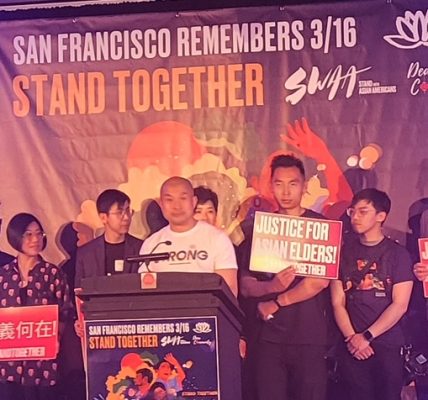by Cherie M. Querol Moreno
SOUTH SAN FRANCISCO, California – This city, where nearly half of residents trace their heritage to the world’s largest continent, formally reopened the country’s pioneer organization dedicated to deterring substance use among Asian Americans and Pacific Islanders.
Music emanated from the balloon-festooned two-story building on 1115 Mission Road here on March 22 as San Francisco Bay Area service providers arrived to celebrate the consolidation of the San Mateo County programs of Asian American Recovery Services and the return of its in-person assistance.
Garbed in their traditional barong Tagalog, innovative terno and vibrant Samoan puletasi, the nonprofit agency management and staff welcomed partners, former co-workers and clients, county and city officials who praised the team’s groundbreaking work to “reduce the impact of substance use” in the focus population through culturally competent pathways. That means planning, implementing and evaluating programs with the ability to understand and respect the diverse belief and value systems across cultures.
“Coming here is like coming home, everyone’s always welcoming,” said guest speaker Allen Bustos, a Filipino American on track to earn his master’s degree after having overcome the habit with empathetic intervention at the agency.
Now simply called and instantly recognized by its acronym, AARS was established in 1985 in San Francisco by community advocates to address the rising rate of substance use in their community.
In 2013 AARS merged with Healthright360, provider of integrated care including primary medical, mental health, substance use disorder treatment and re-entry services in 11 counties.
Loyal to its cultural competence philosophy, its programs in San Mateo County – home of Daly City, Colma, South San Francisco, San Bruno and San Mateo – where FilAms comprise the most AAPI populations, are overseen by Junior Flores, who was born in the Philippines.
GROWING WITH THE PROGRAM
When Anastacio Flores Jr.’s parents brought him and his three older siblings to San Francisco in 1981, the 9-year-old quickly realized that life would not be the same as that they left behind in Lamo, Nueva Vizcaya.
“Junior” was the only Filipino in his 3rd grade class, and his first friend was Korean. He spoke only Ilocano and his classmate only Kugo, but somehow they managed to get along, found ways to communicate and together learned English as well as how to outsmart each other at playing tag.
That openness, confidence and resilience sprang from the nurturance he enjoyed from childhood onward.
“I was blessed growing up (because) aside from my parents and older siblings, I had teachers, coaches and counselors that encouraged and guided me. I assumed everyone had that,” Flores told Inquirer.netUSA. “I realized pretty quickly that wasn’t the case.”
He chose to study Psychology at San Francisco State to delve into behavioral health with the intent of helping those who did not have the tools to face adversity or had lost their way. Unlike himself.
“Always been in the straight and narrow,” he looked back, frankly grateful but not judgmental.
He was hired by AARS to work with Filipino youth in Daly City’s Jefferson Union High School District (JUHSD) of whom many were on probation, he said. His hire date was Sept. 10, 2001. The day after shook the world with the first terrorist attack on American soil, sending him to emergency mode, and testing his mettle.
“I learned that day how to treat your staff and that is with compassion. (Then-JUHSD Trustee) Dave Mineta provided the space and support for everyone to process the horrific events of that day,” he recalled, noting that out of the crisis grew trust and friendship he found with one of the agency’s earliest officers, whom he considers his role model.
Flores worked with the youth sector for five years before moving on to Outpatient Drug & Alcohol Services for Adults (ODASA). There he rose to supervisor to manager then director until the merger. – Adapted from original reprinted with permission from INQUIRER.NETUSA
(To be concluded)













